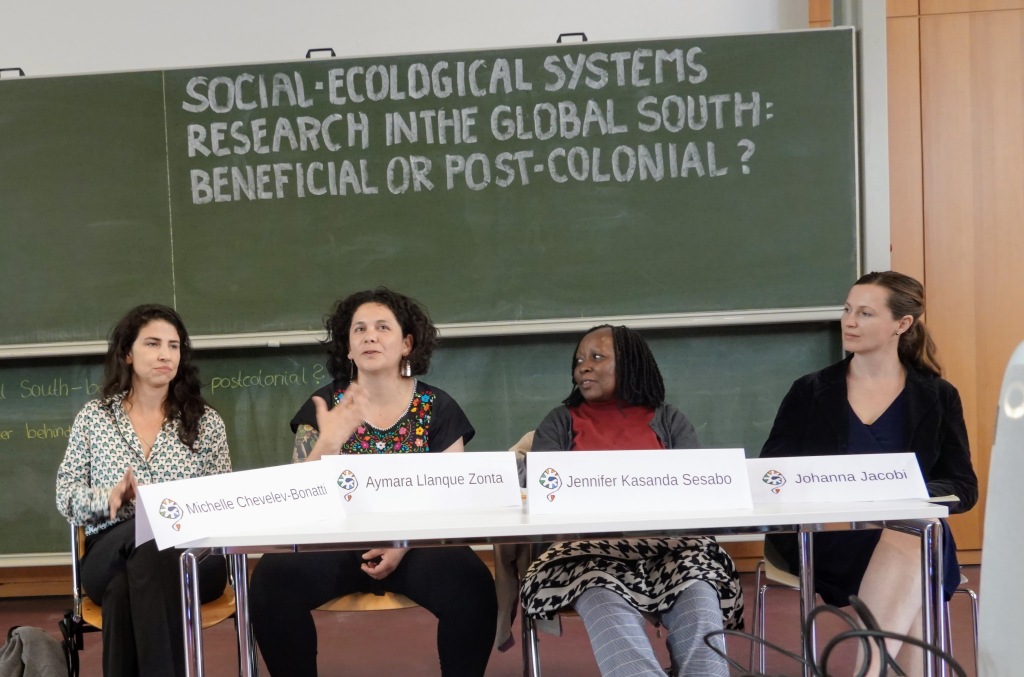
Watch the panel discussion on Youtube here.
The main focus of research in our Social-Ecological Systems institute at the Leuphana University in Lueneburg is on social-ecological systems. It aims to understand the tight connections between humans and nature from a holistic perspective. It combines methods and knowledge from different disciplines and tries to integrate perspectives, values, worldviews from non-academic actors, local people and communities in order to facilitate transformational changes towards justice and environmental health. A lot of this work is happening in places that have a history of colonialism, a history of control and exploitation of territories, people and nature. And many of us academics are from or based in countries that themselves have a history of colonizing, controlling and exploiting.
In the light of those histories, the panel discussion on 13th, June 2024 wanted to discuss what it can mean that social-ecological systems research is beneficial and contributes to a better and just future.
The panelists:
Aymara Llanque Zonta.
Aymara Llanque Zonta is a social scientist with a PhD from the indigenous university Siglo XX in Bolivia and experiences in food sustainability in Latin America and Africa. She currently works as a postdoctoral researcher on regenerative agriculture at the Helmholtz-Centre for Environmental Research in Leipzig and as lecturer here at the Faculty of Sustainability. Aymara is a decolonial feminist activist, working on critical perspectives of sustainability and green alternatives, with a special focus on processes around neo-extractivism in agriculture.
Michelle Bonatti.
Michelle Bonatti is a Associate Professor of Environmental Sociology at the University of Vila Velha, Brazil, and Deputy Head of the Susland Group at the Leibniz-Centre for Agricultural Landscape Research, Germany. She has worked at FAO and led several research platforms and projects in Latin America, Asia and Africa focusing on co-design of innovations and social learning for sustainable land use.
Johanna Jacobi.
Johanna Jacobi is an Assistant Professor of Agroecological Transitions at ETH Zürich where she and her research group study agroecology as a transdisciplinary science, a transformative practice and a social movement. They work currently on farming systems and smallholder communities in Brazil, Bolivia, Ecuador, Ethiopia and the Democratic Republic of the Congo, but make links to globalized markets and value chains and other influencing factors with political ecology approaches.
Jennifer Kasanda Sesabo.
Jennifer Kasanda Sesabo is a Senior lecturer in the Department of Economics at Mzumbe University, Tanzania. Currently, she works as a researcher in the collaborative research project Kili-SES which examines the role of nature for human well-being in the Kilimanjaro
Socio-Ecological System; and in the project “Climate-Smart Futures in Rural Tanzania“ focusing on the role of farmer organisation and women leadership in adopting climate-smart practices by smallholder horticultural farmers, particularly women, and youth in Tanzania.
Watch the panel discussion on Youtube here.
Recommended further reading:
Jacalyn M. Beck, Kevin C. Elliott, Charlie R. Booher, Kristen A. Renn, and Robert A. Montgomery (2021). The application of reflexivity for conservation science. Biological Conservation. 262. https://doi.org/10.1016/j.biocon.2021.109322
